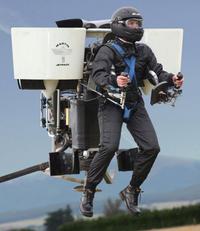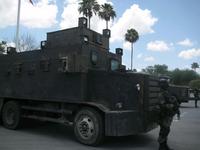-
New powertrain improves fuel economy, adds hp Chevrolet Impala Police
GM says that a new 3.6L V-6 engine and a 6-speed automatic transmission achieves 302 hp and an estimated fuel economy of 17 mpg city and 27 mpg highway — a 3 mpg advantage over previous Impala models and 28 percent better than the Ford Crown Victoria; the 2012 Impala can accelerate from 0-60 mph in 6.6 seconds, based on GM engineering tests
-
-
Apple cracks down on drunk driving evasion apps
At the urging of several U.S. senators, Apple recently announced that it would no longer sell apps that were designed to inform users about police checkpoints for drunk drivers; the senators lauded the move, but said that the company should also remove existing apps from its stores rather than just preventing new ones from going on sale; the senators were targeting apps like PhantomALERT which taps into a phone’s GPS device and alerts the driver of any active law enforcement zone including checkpoints, speed cameras, and speed traps
-
-
Massachusetts firefighters purchase chemical fire equipment
Local firefighters in Massachusetts recently received a new foam trailer capable of pumping out 500 gallons per minute; to control chemical fires and other difficult blazes, firefighters often use foam to coat the fuel to deprive the fire of oxygen; the new foam trailer is particularly useful as Ayer is home to several chemical and electrical facilities
-
-
Three arrested in PlayStation cyberattacks

On Friday, Spanish law enforcement officials arrested three men suspected of hacking into Sony’s PlayStation Network in addition to other major government and corporate websites around the world; the three men are suspected of being the local leaders of a secretive group of international hackers that call themselves Anonymous; the group has claimed responsibility for several high profile attacks on major sites like YouTube, Amazon, the Australian Parliament’s House website, and PayPal
-
-
Firefighters struggling with Arizona's second largest wildfire in history

Firefighters in eastern Arizona are struggling to contain the second largest wildfire in the state’s history; as the blaze burns toward New Mexico, Arizona officials have been forced to evacuate mountain resort communities and close national forests and parks; the wildfire has been burning steadily since 29 May; the conflagration now covers more than 311,000 acres in the White Mountains of eastern Arizona, and is threatening to damage power lines carrying electricity to Tucson; the fire is growing at a rate of four to five miles a day and protracted drought and dry, high winds have hampered efforts to control the blaze
-
-
DHS reduces monitoring of non-Islamic domestic terrorism

In May 2009, DHS issues a report saying that the recession and Obama’s election could lead to a “violent radicalization” of extremist groups in the United States; conservative politicians and commentators charged that the report was an attack on conservative ideology and groups opposing abortion and immigration; in response, DHS has eviscerated the analytical unit which issued the report, cut the number of personnel studying domestic terrorism unrelated to Islam, canceled state and local law enforcement briefings, held up dissemination of nearly a dozen reports on extremist groups, and has blocked the dissemination of a digest of domestic terror incidents and the distribution of definitions for terms such as “white supremacist” and “Christian Identity”; state and local law enforcement and security experts are worried
-
-
Emergency responders could have jetpacks by year's end

Emergency responders in New Zealand could soon be zipping around on personal jetpack; last month, Glenn Martin, an inventor based in New Zealand, successfully flew his jetpack up to a height of nearly 5,000 feet; Martin has been hard at work on the jetpack for the last thirty years and hopes to have his “jetski for the skies” commercially available within eighteen months; the jetpack is essentially two two-liter V4 engines strapped to a carbon fiber frame; the device is wingless and is controlled by two joysticks and can be flown with little pilot training; Martin says that the first people to use the device will be emergency responders conducting search and rescue missions
-
-
Sheriffs in Pasco County, Florida to stop crimes before they happen

Local law enforcement officials in Florida are taking a new more proactive approach to fighting crime; last week Pasco County Sheriff Chris Nocco announced that the department would begin implementing what he calls “intelligence-led policing”; under his plan, officers will focus on gathering intelligence and sharing that information with local, state, and federal agencies to stop crimes before they occur; according to Sheriff Nocco 6 percent of offenders commit 60 percent of crimes, and so his department will begin more closely monitoring these individuals; Nocco has requested additional staff to help map crime patterns and share intelligence; critics of the approach are concerned about the notion that police officers are closely monitoring people who have not committed any crimes
-
-
A machine that predicts crime
The very effort by individuals who are intent on committing a crime to mask their intent has detectable physiological manifestations; it should thus be possible to build a sensor which would identify these manifestations and correlate them with the underlying malintent
-
-
Anytime, anywhere communications across all devices enhances collaboration

Connecticut-based company offers anytime, anywhere communications across all types of devices — allowing public safety, emergency response, and select critical infrastructure entities to communicate and collaborate in the event of an emergency; the system may also be used by the military — in the field thousands of miles away — to alert, and provide information to in real time, domestic emergency agencies
-
-
42 million displaced by natural disasters in 2010

In 2010 approximately forty-two million people were displaced from their homes due to natural disasters, more than double the number of people forced to relocate in 2009; the latest numbers were calculated by the Internal Displacement Monitoring Centre (IDMC), which found that more than 90 percent of disaster displacements were the result of weather-related events; the number of natural disasters has doubled from roughly 200 to over 400 a year during the last twenty years; the report found that countries on all continents were affected by the increase in natural disasters, but Asian countries have been hit the hardest
-
-
Mexican drug cartels build "narco tanks"

In the latest development in Mexico’s bloody drug trade, it seems that rival cartels are building large armored vehicles in their fight against one another; over the weekend, the Mexican Army found two “Mad Max” style “narco tanks” in Ciudad Camargo in the state of Tamaulipas near the Texas border; the two vehicles had inch-thick steel armor and were built on a three-axle truck bed with a heavily armored cabin; the vehicles were capable of withstanding fire from 50 caliber mounted weapons and grenade blasts; so far none of the tanks have been used to confront the Mexican Army and officials believe that they are primarily used in inter-gang warfare
-
-
Middlesex County, N.J. gets $1 million for mobile tent system
Local emergency responders in New Jersey recently received a big boost in disaster preparedness from DHS; last week the county unveiled a new 3,000 square foot mobile structure comprised of interlocking tents and trailers; the tents can be quickly set up to treat victims of a radiological accident, terrorist attack, pandemic, or weather emergency; the tent system can also be outfitted with its own water supply, power generator, and heating and cooling systems. They are even equipped with lights, showers, sinks, and a kitchen; for training purposes, the tents were set up at the Middlesex County College campus; the portable structure, called the Gatekeeper system, cost $1 million and was paid for with DHS grant money; county officials also received DHS grants to purchase mobile radiation detection devices for police officers; the tents and the radiation detectors come as part of a broader government effort to prepare local law enforcement agencies within a forty-five mile radius of New York City for a dirty-bomb attack
-
-
Connecticut addresses children's needs in disasters
Lawmakers in Connecticut recently passed legislation to help ensure the safety of children during a natural disaster or terrorist attack; on Tuesday, Connecticut’s House of Representatives approved a bill that would require the state to include the well-being of children in its emergency response plans; the bill passed 125 to 1 on Tuesday; under the law, the Commissioner of Emergency Management and Homeland Security is required to file annual reports that address the health needs of children during a biological attack or other incidents; the bill is currently on its way to Governor Dannel P. Malloy who is expected to sign it into law
-
-
Louisiana parish appoints new emergency preparedness chief
Ouachita Parish, Louisiana has ended their six-month search for a new director of Homeland Security and Emergency Preparedness just as hurricane season is about to hit; the parish’s Homeland Security Committee appointed Tracy Hilburn as the agency’s new director; the committee said that it was critical to have a new director in place before 1 June, the official start of the Atlantic Ocean’s hurricane season; as director of the parish’s Homeland Security and Emergency Preparedness agency, Hilburn will be responsible for coordinating evacuations for not only Ouachita, which is the largest parish with nearly 150,000 residents, but also the surrounding parishes
-
More headlines
The long view
Why Ukraine’s AI Drones Aren’t a Breakthrough Yet
Machine vision, a form of AI, allows drones to identify and strike targets autonomously. The drones can’t be jammed, and they don’t need continuous monitoring by operators. Despite early hopes, the technology has not yet become a game-changing feature of Ukraine’s battlefield drones. But its time will come.
